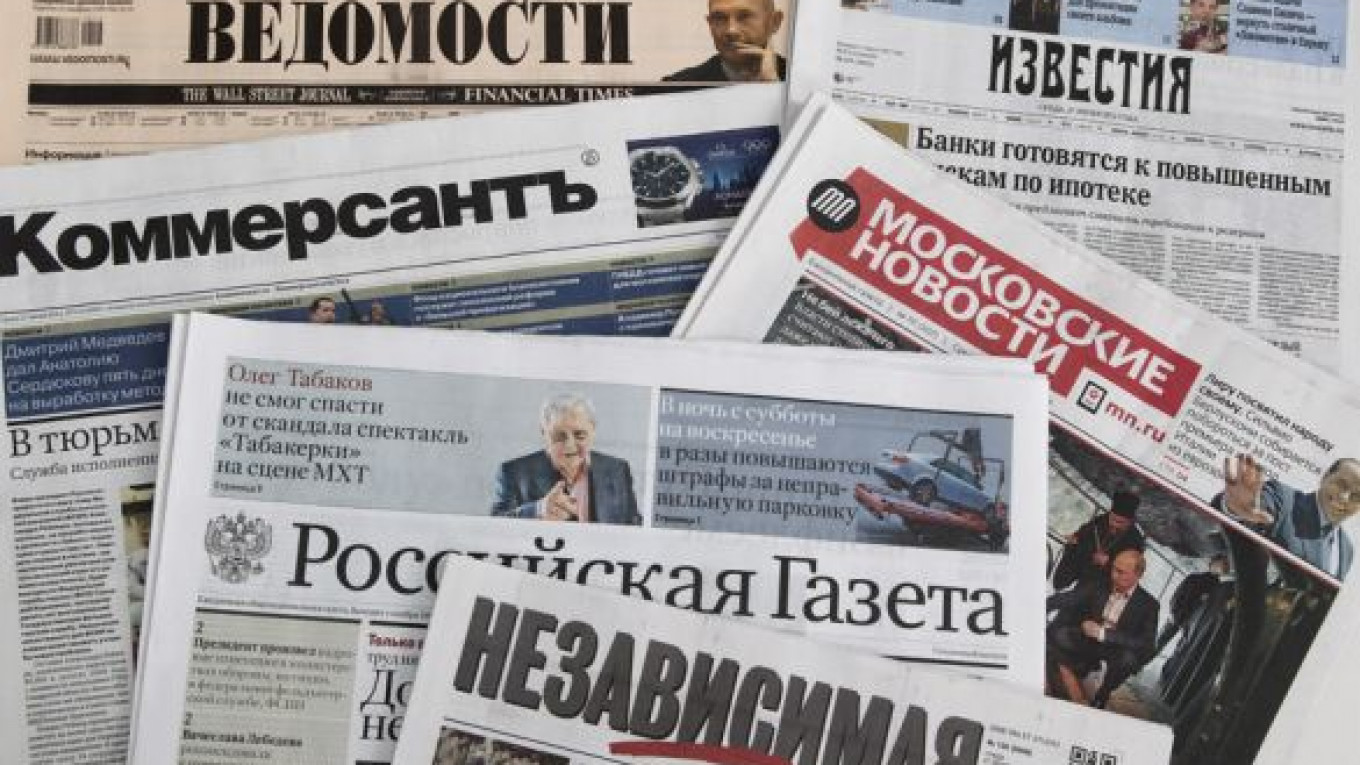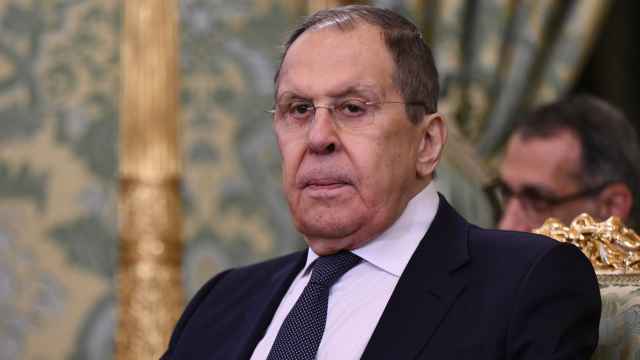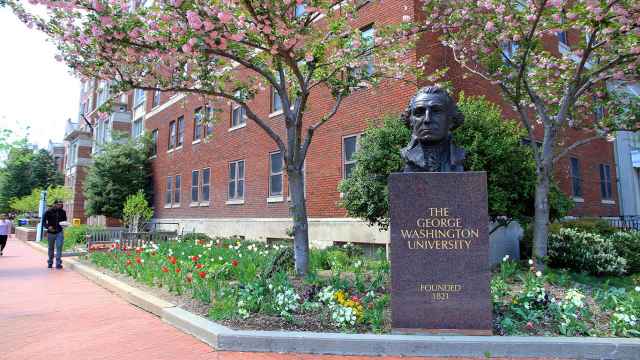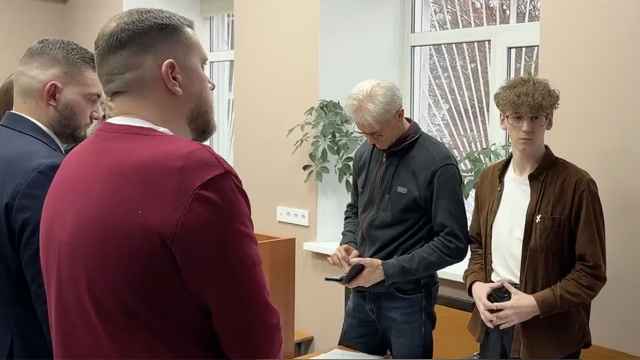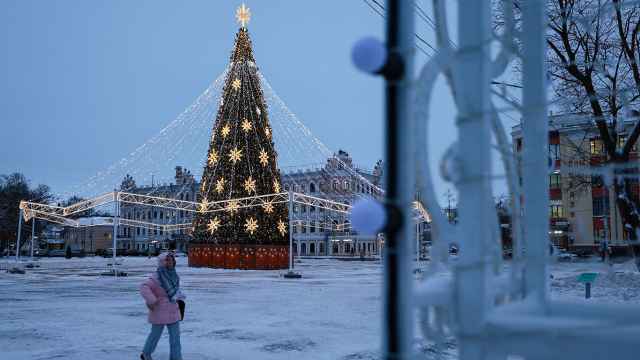Kommersant
1. Ilya Barabanov and Taisia Bekbulatova article headlined "One does not recognize, another does not invite" says opposition mayoral hopeful Alexei Navalny has refused to recognize the voting results made public by the Moscow City Elections Commission, in accordance with which his opponent, Acting Mayor Sergei Sobyanin won in the first round of the election. Navalny suggested that talks should be held between him and Sobyanin, the election headquarters of the latter expressed doubt that it would be possible; pp 1, 3 (1,213 words).
2. Nina Vlasova article headlined "Banks tighten retail networks" says the Central Bank's plans to reduce interest rates on consumer loans will affect both banks and retail networks, as banks providing these loans have started negotiating discounts in interest rates with shops where their affiliates operate; pp 1, 8 (616 words).
3. Yegor Popov and Ivan Safronov article headlined "Rosneft tries military uniform on" says Rosneft's and Gazprombank's shipbuilding consortium is to control the shipyard being built at the Zvezda plant in Maritime Territory and also to supervise almost all far eastern enterprises of the Russian United Shipbuilding Corporation. The consortium will not only build shelf equipment, but also new ships and scrap old submarines as part of the state defense order; pp 1, 9 (766 words).
4. Gleb Cherkasov article headlined "Labor stands high" says the Sept. 8 single voting day has proven that it is hard to be engaged in public politics in Russia, but it is still possible for opposition candidates to win regional elections; p 1 (448 words).
5. Viktor Khamrayev and Maxim Ivanov article headlined "Minority of Russians get interested in honest elections" attributes United Russia's success in the regional elections to low turnout and indifference of the electorate; p 2 (1,030 words).
6. Grigory Tumanov and Vyacheslav Kozlov article headlined "They stand up for Alexei Navalny in Bolotnaya square" reports on a rally in support of opposition activist Navalny held in Moscow on Sept. 9; p 3 (267 words).
7. Maria Plyusnina article headlined "Yekaterinburg elects City without Drugs" comments on the victory of the Civic Platform party candidate and founder of the City Without Drugs fund, Yevgeny Roizman, in Yekaterinburg mayoral election. United Russia is surprised with the results of the voting, the article says; p 3 (540 words).
8. Anna Pushkarskaya article headlined "Karelia capital passes to opposition" comments on the victory of Yabloko party candidate Galina Shirshina in the Petrozavodsk mayoral election; p 4 (528 words).
9. Dmitry Malkov and Irina Nagornykh article headlined "Authoritative entrepreneur legalizes himself via his nephew" says the Patriots of Russia party candidates supported by entrepreneur Anatoly Bykov have got a majority in the Krasnoyarsk city council. Experts attribute the victory to the protest voting of the electorate; p 4 (538 words).
10. Sofya Samokhina et al. report headlined "Tatyana Golikova to love audit" says President Vladimir Putin has nominated his aide and former Health Minister Tatyana Golikova for the post of the Audit Chamber head; p 4 (565 words).
11. Alexander Chernykh and Diana Munasipova article headlined "Academicians agree to amendment" says a Russian Academy of Sciences meeting has decided to draft amendments to the bill on the academy reform rather than demand that the reform be canceled; p 5 (529 words).
12. Yelena Chernenko interview with Deputy Foreign Minister of the Russian Federation Grigory Karasin speaking on Moscow's policy in Central Asia; p 6 (746 words).
13. Sergei Mashkin article headlined "Diplomat stopped with hoax" reports on the murder of Russian diplomat Dmitry Vishernev in Abkhazia. The authorities believe it was politically motivated, while the investigation is following several other leads; p 6 (503 words).
14. Galina Dudina and Yelena Chernenko article headlined "Peaceful aim shown to Syrian chemical weapons" says Damascus has listened to Moscow's advice to establish international control over its chemical weapons. The move has not persuaded the U.S. to give up plans to launch an air strike against Syria, article says; p 6 (531 words).
Nezavisimaya Gazeta
1. Alexandra Samarina article headlined "Death of political brands" says that the growing demand for personalities rather than political party brands has become a new trend in the Russian politics. The recent regional election campaign has proven the trend, the article says; pp 1, 3 (1,213 words).
2. Yevgenia Novikova article headlined "U.S. demands that Assad lay down chemical weapons" says Moscow and Damascus seem to have found a way to avoid the foreign military intervention in Syria. U.S. Secretary of State John Kerry has said that the U.S. would revise its military strike plans if Damascus placed its chemical weapons under international control; pp 1, 8 (951 words).
3. Ivan Rodin article headlined "Kremlin to keep single voting day in September" says that having summed up the results of the single voting day, the opposition suggested that it should be moved to a later autumn date; however, United Russia and the Central Elections Commission oppose the suggestion; pp 1, 3 (769 words).
4. Andrei Vaganov article headlined "Academicians asked not to get involved in politics" says the bill on the reform of the Russian Academy of Sciences will be discussed in the third reading as the academy itself agreed to that; pp 1, 5 (800 words).
5. Olga Loginova article headlined "Olympic mopping up in Sochi" reports on raids against illegal migrants held in Sochi. The police, migration service officials and Cossacks are checking houses where illegal migrants may live; pp 1-2 (555 words).
6. Editorial headlined "Run-off election ghost" says mistrust in elections is urging some Muscovites to call for the run-off. The article analyses reasons for opposition candidate Navalny's success and notes that he would not win the run-off election if it were held; p 2 (511 words).
7. Mikhail Solopov article headlined "Competition turns into legitimacy" says the regional election campaign in Russia has been held with political competition and minimum violations of the law that could affect the outcome of the voting; p 2 (1,073 words).
8. Alexei Fenenko article headlined "Carte blanche: Forced disarmament of Damascus" looks at the reasons making the U.S. push for the air strike against Syria. The author notes that reluctance of some U.S. allies within NATO to support the plans creates serious problems for Washington; p 3 (625 words).
9. Tatyana Dvoynova article headlined "Vladivostok mayor elected in record-breaking silence" looks at the mayoral election in Vladivostok held on Sept. 8; p 6 (700 words).
10. Viktoria Panfilova article headlined "Chinese railway to halve Kyrgyzstan" says Chinese plans to build a railway connecting the country with Kyrgyzstan and Uzbekistan affects Russian strategic interests in the region; p 7 (588 words).
Vedomosti
1. Margarita Papchenkova et al. report headlined "How much Russia costs" says the Finance Ministry has issued eurobonds for $7 billion, which enjoyed great demand on the stock market; pp 1, 14 (679 words).
2. Maria Zheleznova and Yelena Myazina article headlined "Away victory" says opposition Moscow mayoral hopeful Alexei Navalny does not recognize the official results of the voting, while the winner of the race, Sergei Sobyanin, is not ready even to hold talks with his opponent; pp 1-2 (605 words).
3. Editorial headlined "September evolution" says the regional election campaign has shown that United Russia does not always win without vote rigging and that Russian opposition leaders have left their ghettos and become generally known; pp 1, 6 (398 words).
4. Maxim Glikin article headlined "Victorious retreat" says that although United Russia will dominate in all regional legislative assemblies, its performance in the recent election was worse than in the elections in 2007 to 2009. The party managed to keep the majority in the regional parliaments largely due to its candidates elected in single constituency districts; p 3 (465 words).
5. Alexei Nikolsky article headlined "Disarmament instead of war" says that by urging the Syrian regime to place chemical weapons under international supervision, Russia has for the first time in several weeks supported the U.S. stance on Syria; p 3 (350 words).
6. Another editorial headlined "Navalny's exceptional case" says both Sergei Sobyanin and Alexei Navalny have benefited from the mayoral election campaign in Moscow, as the former won the election and the latter proved to be a real politician and a good organizer; p 6 (299 words).
Rossiiskaya Gazeta
1. Lyubov Protsenko article headlined "First one" reports on the victory of Acting Mayor Sergei Sobyanin in the city mayoral election; pp 1-2 (728 words).
2. Vladislav Vorobyev article headlined "Saying goodbye to chemical weapons" gives details of the Russian and Syrian foreign minister talks in Moscow and notes that Russia has urged the Syrian authorities to place its chemical weapons under international supervision; pp 1, 8 (837 words).
3. Taras Fomchenkov article headlined "Ulyukayev's list" reviews economic benefits from the WTO membership announced by Deputy Economic Development Minister Alexei Ulyukayev; pp 1, 5 (484 words).
4. Yury Gavrilov article headlined "Conscript to get choice" says the Defense Ministry plans to amend the bill on military conscription to allow university and college graduates to choose between a year of military service and two years of contract-based service with better conditions; pp 1, 9 (738 words).
5. Alexander Mikhaylov article headlined "Next morning after elections" looks at the results of the single voting day in Russian regions; p 2 (1,027 words).
6. Political analyst Leonid Radzikhovsky article headlined "Call" analyses the results of the regional elections in Russia on Sept. 8; p 3 (1,300 words).
7. Ilya Zubko article headlined "Olympic park" says that with 150 days ahead of the Sochi Winter Olympics, stadiums and other sports infrastructure is ready for the event; p 14 (1,100 words).
Izvestia
1. Natalya Bashlykova and Anastasia Kashevarova article headlined "Sergei Stepashin tipped for MSU rector" says presidential aide Tatyana Golikova nominated by Vladimir Putin for the post of the Audit Chamber head is likely to get the State Duma approval, while the present head of the chamber, Sergei Stepashin, is expected to become Moscow State University head; pp 1-2 (857 words).
2. Mikhail Rubin article headlined "United Russia's support grows by one-third in two years" says the regional election campaign has shown that the electorate has got tired of the opposition, as United Russia candidates enjoyed greater support than in the State Duma election in 2011; pp 1, 3 (998 words).
3. Yelena Teslova interview with elected governor of Moscow Region Andrei Vorobyov speaking on the election, his opponents and plans for work in the future; pp 1, 5 (702 words).
4. Yulia Tsoy article headlined "Navalny becomes stable" says a rally of Navalny's supporters will not affect the Moscow mayoral election results; p 3 (751 words).
5. Dmitry Yevstifeyev article headlined "New trials await former mayoral candidate after election" says experts and lawyers are divided over prospects for the opposition leader Alexei Navalny after the mayoral election; p 3 (850 words).
6. Darya Tsoy et al. report headlined "U.S. does not intend to ease pressure on Iran" says the European court in Luxembourg has ruled to unfreeze the accounts of seven Iranian banks and companies as their involvement in the nuclear program was found unproved; p 7 (467 words).
7. Boris Mezhuyev article headlined "Festival of low turnout" looks at the Moscow mayoral election held on Sept. 8 and says the voter turnout was low; p 9 (810 words).
Moskovsky Komsomolets
1. Mikhail Rostovsky article headlined "Old mayor, new world" says the Moscow mayoral election campaign has shown that Russia managed to get rid of elections without alternative and political competition; pp 1-2 (1,035 words).
2. Marina Ozerova article headlined "Experiment with potatoes" comments on low turnout in the Moscow mayoral election. The parliamentary opposition attributes the trend to the time of the voting: Many Muscovites were busy gathering crops at their dachas; pp 1-2 (664 words).
3. Olga Rakhmidzhanova article headlined "Will Navalny be jailed now?" polls experts who try to predict the political future for Moscow mayoral opposition candidate Alexei Navalny; p 2 (731 words).
4. Stanislav Belkovsky article headlined "Fear and hatred in Moscow" analyses the results of the Moscow mayoral election; p 3 (900 words).
Noviye Izvestia
1. Valery Yakov article headlined "Border closed by Nazi lock" claims that ethnic minorities, namely Chechens, are being discriminated when returning to Russia from abroad. The author reports on the questioning of Chechens by border guards at Moscow's Sheremetyevo Airport; pp 1, 5 (929 words).
2. Mikhail Nikiforenko report "Elections. Epilogue" looks at the elections held in Russia on Sept. 8 and says that according to analysts, the recent elections have revealed two trends: Prominent non-systemic opposition leaders are integrating into the official politics and the so-called old opposition has proved unable to compete with the "renewed" figures from the authorities; p 2 (850 words).
3. Gennady Savchenko report "Shooting at Moscow" says that a Russian diplomat has been killed in Abkhazia five years to the day after Russia recognized Abkhazia's declaration of independence from Georgia; p 2 (400 words).
4. Arina Raksina report "It's not figures" says that President Vladimir Putin has nominated former Health Minister Tatyana Golikova as the new head of the Russian Audit Chamber. Experts doubt that she possesses the qualities that a person on this post should have; p 3 (900 words).
RBC Daily
1. Yulia Yakovleva article headlined "New authorities" attributes the victory of opposition candidates on the single voting day to their personal qualities such as charisma and experience; pp 1-2 (850 words).
2. Stepan Opalev report "Skill of losing" says that the election headquarters of protest leader Alexei Navalny, who came in second in the mayoral election in Moscow, have not recognized the results of the vote; p 2 (350 words).
3. Alexander Litoy report "Time to burn has not come" says that a rally to support Alexei Navalny was carried out peacefully on the first day after the mayoral election in Moscow; p 3 (500 words).
4. Article by Konstantin Kostin, chairman of the board of the Foundation for the Development of Civic Society, headlined "Good campaign" comments on the elections held in Russia on Sept. 8; p 6 (850 words).
5. Irina Yuzbekova report "Channel One's website is not first" says that the company TNS Rossia has published the rating of video resources of the Russian internet. YouTube tops the list, article says; p 9 (250 words).
Komsomolskaya Pravda
1. Dmitry Smirnov report "Putin demands that embezzlement of public funds be stopped" says that Putin has discussed problems of the North Caucasus at a meeting of the Russian Security Council; p 2 (550 words).
2. Alexander Grishin report "Fight is fiercer and turnout lower" features comments of political analysts on the Sept. 8 elections in Russia; p 3 (1,100 words).
3. Andrei Gorbunov interview "I am not opposition activist" with opposition candidate Yevgeny Roizman who has been elected mayor of Yekaterinburg; p 4 (400 words).
4. Nigina Beroyeva report "Navalny does not recognize voting results" says that Alexei Navalny's election headquarters have said that the Moscow mayoral election may be rigged; (300 words).
5. Yelena Nazarova report "This is honest!" says that experts have highly appreciated the results of voting in the Moscow mayoral election; p 11 (350 words).
6. Yelena Krivyakina interview with chairman of the Council for Foreign and Defense Policy Fyodor Lukyanov who comments on possible consequences of the Syrian crisis; pp 14-15 (2,300 words).
7. Viktoria Alexanderova report "Premier is without portfolio" says that the British prime minister has left classified documents on a train; p 15 (250 words).
Moskovskiye Novosti
1. Alexandra Ilyina report "Victory with 1.37 percent" says that Acting Mayor Sergei Sobyanin has been re-elected avoiding a run-off; p 2 (750 words).
2. Lana Samarina report "G20: Politics vs economy" looks at the recent G20 summit in St. Petersburg and says that the Syrian issue has intervened in the economic agenda of the meeting; pp B2-B3 (1,400 words).
Krasnaya Zvezda
1. Viktor Ruchkin report "Three days for bombing" features author's comment on the situation Syria and the U.S.'s possible military actions against the country; pp 1, 3 (1,100 words).
2. Andrei Garavsky report "Heading for Mediterranean" says that the Russian Navy continues to reinforce a group of its warships in the Mediterranean; p 3 (500 words).
Trud
1. Sergei Rusev report "Elections were fair and sky did not fall on ground" comments on the Sept. 8 elections in Russia; pp 1-2 (1,400 words).
2. Pavel Orlov report "And what if Syria has S-300?" looks at the possible development of the Syrian crisis and the U.S.'s involvement in it and features comment of former commander-in-chief of the Russian Ground Troops Vladimir Boldyrev; p 2 (600 words).
Tvoy Den
1. Brief unattributed report "Let's support Syria!" says that Foreign Minister Sergei Lavrov has said at a news conference with his Syrian counterpart Walid Mu'allim in Moscow that Russia will do its best to prevent military intervention in Syria; p 2 (100 words).
A Message from The Moscow Times:
Dear readers,
We are facing unprecedented challenges. Russia's Prosecutor General's Office has designated The Moscow Times as an "undesirable" organization, criminalizing our work and putting our staff at risk of prosecution. This follows our earlier unjust labeling as a "foreign agent."
These actions are direct attempts to silence independent journalism in Russia. The authorities claim our work "discredits the decisions of the Russian leadership." We see things differently: we strive to provide accurate, unbiased reporting on Russia.
We, the journalists of The Moscow Times, refuse to be silenced. But to continue our work, we need your help.
Your support, no matter how small, makes a world of difference. If you can, please support us monthly starting from just $2. It's quick to set up, and every contribution makes a significant impact.
By supporting The Moscow Times, you're defending open, independent journalism in the face of repression. Thank you for standing with us.
Remind me later.


